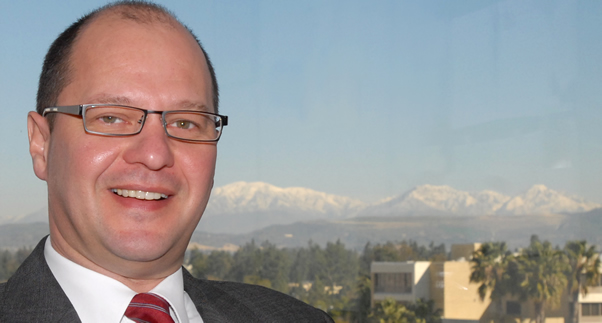Global Business Perspectives
Visiting Professor From Switzerland Discusses Intercultural Communication
February 19, 2008
By Valerie Orleans
Americans are friendly and direct. We often don’t speak any language other than English. But we are, for the most part, attentive, outgoing and curious about new people and cultures.
These are some of the observations of visiting professor Robert Buttery, a lecturer in international studies and business communications at the University of Applied Sciences in Northwestern Switzerland.
Recently on campus, Buttery spoke to classes of business writing students on how they might pursue jobs in Europe or other European-based international businesses. Buttery discussed resume writing, how to conduct a job search abroad and intercultural communications, as well as comparing the education and experiences of American students to their European counterparts.
Buttery's trip was sponsored through the Mihaylo College of Business and Economics BEST (Business Europe Study Tours) Program, (http://business.fullerton.edu/StudentServices/best/index.htm) developed to enhance the breadth of business education offered to Cal State Fullerton students and to encourage them to consider career opportunities globally. The program offers a summer program for Cal State Fullerton students as well as an exchange program for European students. It also offers faculty exchanges between Cal State Fullerton and European universities.
“It was a great opportunity for our students to have these lectures delivered by someone like Professor Buttery, who has considerable business and educational experience in a number of European countries,” said Kim Tarantino, lecturer in accounting and associate coordinator of the three-week summer program.
“Students need to understand that international companies will look not only at their education but at their experience,” Buttery explained. “There is a focus not only on what they’ve achieved in the classroom but also how they’ve participated in team projects or shone in business-related environments. When interviewing in Europe, students need to stress what they can do for a company and be able to demonstrate it through their experience and extra-curricular activities.”
Speaking another language also helps. In Switzerland alone, four languages are spoken: German, French, Italian and Romansch. Most citizens also speak English. Switzerland is a microcosm of Europe, with multiple cultures represented.
“I see that here as well,” Buttery said. “But what Americans have in common with others from different cultures is a common language. Europeans tend to learn multiple languages because the countries are so geographically near one another and we must learn to speak to one another.”
According to Buttery, most Europeans will accept Americans as part of their work force — the key is getting into the “inner circle.”
“I tell the students, there is not a ‘one size fits all’ strategy,” Buttery said. “They need to keep their eyes and ears open and understand that they are in a different environment. Practices and methods may be different in Europe and if they want to work well with their teams, they will have to adjust accordingly.
“It takes time to build friendships,” said Buttery. “And some Europeans are more reserved than Americans. This can be perceived as coldness or rude behavior. It is not. I tell American students to work on a ‘softly, softly’ approach — if you’re not careful, Americans can come across as pushy when they’re merely trying to be friendly. Remember, you don’t have to tell your life history in an interview — just the pertinent details.”
On the other hand, Buttery likes the friendliness and openness of Americans.
“For instance, when I was on my way to campus, I stopped by Starbucks,” he said. “I was dressed in a suit and the woman at the counter looked at me and said, ‘Oh, don’t you look nice — you must have an important meeting today.’ That comment made me feel good. You don’t usually find that sort of direct, friendly behavior in Europe.”
Demonstrating a willingness to learn and adapt can go a long way in becoming accepted in Europe.
“European companies are interested in hiring Americans to work on international teams,” he said. “But in order to do so, you must focus on your communication skills. It makes good business sense. If your communication is efficient and clear, you can conduct business more successfully.”
For instance, in Switzerland, meetings are usually clearly defined. There is a purpose, a clear agenda, a sense of who needs to attend, who needs to speak, what information is needed, etc.
It also is imperative that managers have a broad understanding of what is going on in other areas of the company.
“A good manager knows what is happening in many different divisions,” Buttery said. “It’s not as helpful if you only know what’s going on in your division. There is a value to knowing about many different areas. I think there is more emphasis on specialization here, where European companies may be looking for more cross-functional teams. I tell students when they are choosing their majors to look for classes outside their major as well. That will help them become more well-rounded and more attractive to international companies.”


